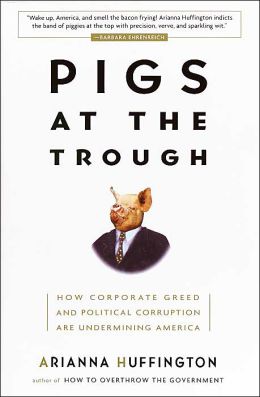So much for Republicans eliminating pork!
 | ||||
Gluttonous Farm Bill
Volume XVIII No. 48: November 27, 2013
Thanksgiving is a day to pause and give
thanks. Yet when it comes to agriculture, lobbyists and farm state lawmakers
just can’t seem to get enough. While they should take Thanksgiving to think
about just how great they have it, they’re actually bickering over who gets the
next big helping of taxpayer subsidies.
The agriculture sector has a lot to be
thankful for. As the USDA just reported, net farm income for 2013 is
set to be a record $131 billion. That’s 15% more than last year and, after
adjusting for inflation, the best year since 1973. Yet the appetite of industry
lobbyists and farm state lawmakers is unquenchable. Now attempts to negotiate a
compromise farm bill have broken down as each individual lobby pushes for a
greater piece of the taxpayer dollar pie.
Covering everything from loan guarantees for
biofuels facilities and grants for drinking water wells to food assistance and
crop insurance, the farm bill is a nearly $1 trillion buffet of
special interest dishes. And it’s a spread that routinely costs more than
expected – the last two farm bills are on pace to cost $400 billion more than
was estimated when they were adopted. With our nation now $17 trillion in debt
and after receiving a directive to find budget savings, the agriculture
committees are being forced to change their ways. But treating the bill as
something other than a bird to stuff with parochial giveaways is proving hard
for them to stomach.
One of the richest parts of the farm bill is
the federally subsidized crop insurance entitlement
program. Producers of everything from almonds to oysters receive taxpayer
subsidies to buy insurance, not just on their crops, but usually on the revenue
they expect from those crops. It’s extremely (overly) generous, on average more
than 60% of the premium is covered by taxpayers, and the program cost $14
billion last year – in a year with the best profits in more than a generation!
But the agriculture committees aren’t looking to enact common sense reforms to crop insurance, but
instead to expand the program and actually increase spending.
For the last two years they’ve attempted to add every dish they can onto the crop insurance gravy train. The centerpiece turkey is taken care of with mandates for “business interruption” insurance for poultry producers who experience losses due to slaughterhouse bankruptcies or “catastrophic events,” aka the weather. Not into poultry—you’re covered! Producers of your holiday ham could get their own insurance for disease outbreaks, there’s profit margin insurance for catfish producers, and even a directive for USDA to study policies for seafood harvesters. Yes, seafood crop insurance. One can only guess we’ll pay the difference if boatmen are looking for jumbo shrimp but only net medium ones.
But it’s not just the meat getting attention.
There’s a mandate to create peanut revenue insurance. The House gives priority
to rice. The Senate expands this to cover all specialty crops, USDA speak for
basically everything you’d recognize as a fruit or vegetable. There’s also a
focus on sugar cane, sweet sorghum, and other “dedicated energy crops.” Even the
tablecloth is covered, as cotton gets its own elite program added on top of crop insurance. And
no worries if you leave those leftovers out too long and they begin to spoil,
there’s priority consideration in developing a crop insurance policy to cover
losses due to “health advisory, removal, or recall related to a contamination
concern.”
Taxpayers can’t afford for the agriculture
committees to continue to write farm bills that, as House Agriculture Committee Chairman Lucas (R-OK)
said himself, "get us through bad times and make the good times better.” Reforming crop insurance so that it’s part of a
cost-effective, accountable, transparent, and responsive agriculture safety net
is possible. But lawmakers will have to first stop the mad scramble to load up
their platters with parochial giveaways and reflect on just how great they
already have it. There’s no better day to do that than
Thanksgiving.
Quote of the Week
"Have you ever wondered why farmers are not asking for a farm bill? They do not need one. Their crops will grow without one."
-Minnesota farmer Harlan R. Anderson in the Minneapolis Star Tribune

No comments:
Post a Comment